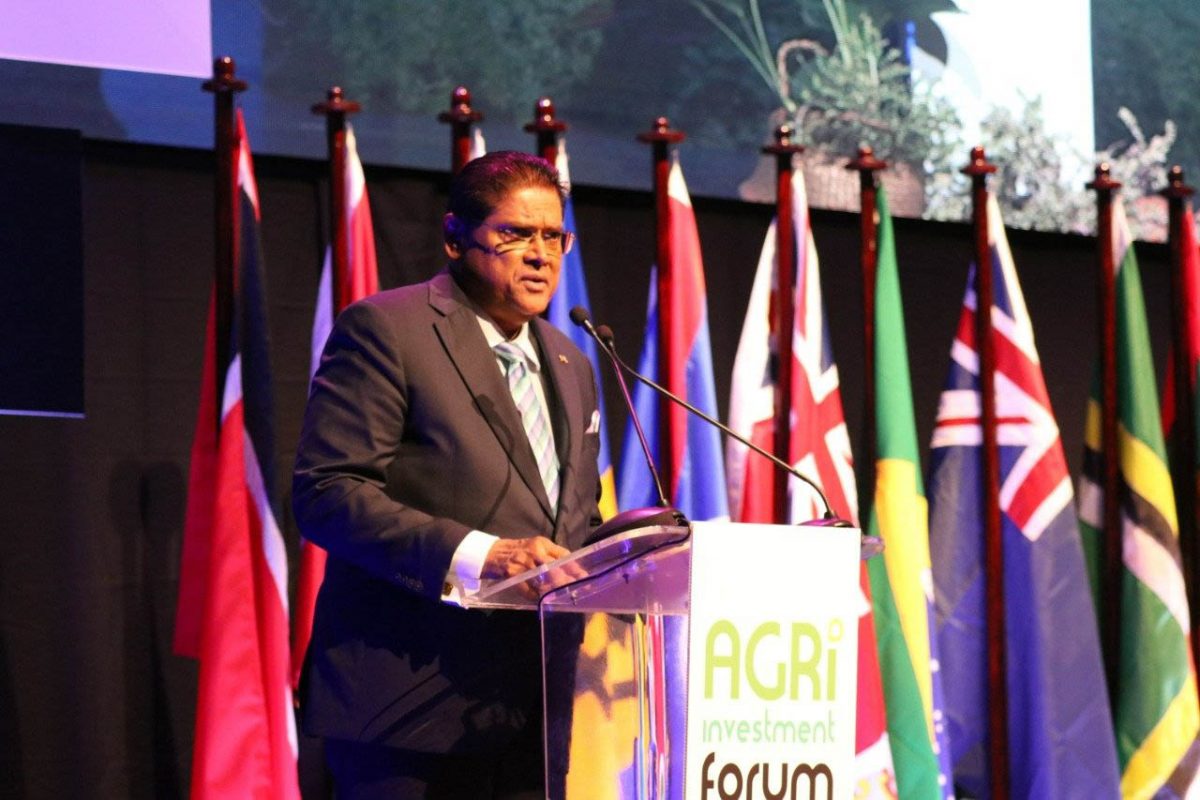President of Suriname Chandrikapersad Santokhi on Friday, announced that his country will be making lands available to regional farmers in an effort to further CARICOM’s 25 by 2025 plan.
He made the announcement while addressing the opening of the second instalment of the Agri-Investment Forum in Port of Spain, Trinidad.
Santokhi, who is the current Chair of the CARICOM bloc, said “…in order to contribute and support this [25 by 2025 plan] my country Suriname will make land available for agriculture production, fostering partnerships between Surinamese and other Caribbean producers and processors. I’m taking this opportunity to invite the private sector to make use of this opportunity.
“Furthermore, Suriname has committed itself, to make 10 hectares of land available, for setting up an innovative campus, where students and startups, from the Region, will be facilitated, to conduct research and development studies. Where government, and the business community, will invest in technological solutions that improve resource efficiency, increase resilience to climate change, unlock new ways to drive growth, realize operating efficiencies, and mitigate risk.”
The campus, according to the Surinamese President, should become an innovative hub for the Region where experts within CARICOM will also be attracted for knowledge sharing. He said that the future of the region depends on the youth and support is going to be critical for the sustainable development of CARICOM.
Santokhi said that agriculture in the region is at a crossroads noting that there is a need for a complete transformation and the realignment of CARICOM’s food system has never been so urgent. He said that it requires the region to press the reset button as it relates to agriculture finance, rural infrastructural development, climate-smart agriculture, water management and use, agri-technology, cross-border investments, fisheries development, increased intra-regional trade and food security.
“Agriculture is a major economic pillar for our economies and has the potential to build economic resilience and drive inclusive socio-economic development. The region has prioritised the modernisation of its regional agriculture sector as a key driver for economic growth and development. This involves expanding regional production, introducing new and appropriate technologies, investing in human capital development as well as research and development and intensifying intra-regional trade in agricultural commodities and produce. Investment and Financing are vital to the transformation of regional agriculture and must be pursued with tremendous and urgent enthusiasm,” he said.
He added that the targets of the 20 by 2025 plan address several areas, including primary production, import replacement, manufacturing, removal of all barriers to trade, reduction of SPs-related blockages, review updating of the current structure of the regional CTE, agro-processing, intra-regional trade, digitalization and E-commerce. He noted that the agribusiness sector in the Caribbean has immense potential and presents opportunities for advancement.
Santokhi related that CARICOM has to build partnerships with the wider world, the regional private sector and financial institutions. He said that there are over “24 different shovel-ready projects” that were presented at the inaugural Agri-Investment Forum in Guyana and later in Barbados at their Agri-Expo ready to be implemented. He valued them at over US$150M.
“Our ever-increasing food import bill, concerns over the impact, of climate change, on the agriculture industry, and apprehension of another crisis or disaster event, severely affecting our food security, demands a collective response,” he said.
Also addressing the gathering was Chair of the CARICOM Private Sector Organisation (CPSO), Gervase Warner. He told the regional leaders that while CARICOM imports more than US$4 billion in food and agri products, the region has the capacity to currently produce at least US$1.2 billion of what is being imported.
He identified that capacity exists in meat and poultry, vegetables, beverages, fish and cereal. He said that currently the region has the capacity to produce more poultry than what is consumed but pointed to the lack of infrastructure to support this. He further stated that there is a need for specific incentives to further the investment in food production to support CARICOM’s plan.










